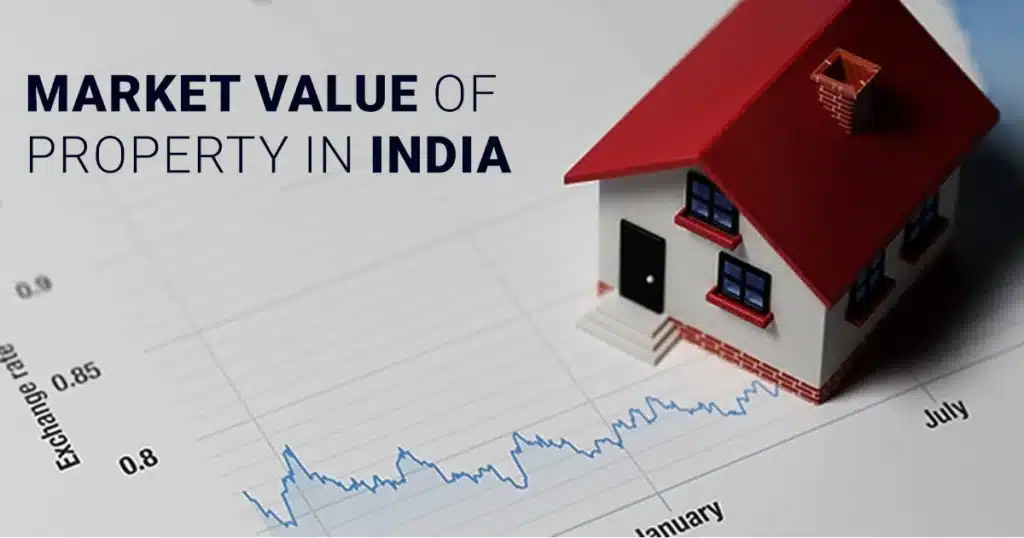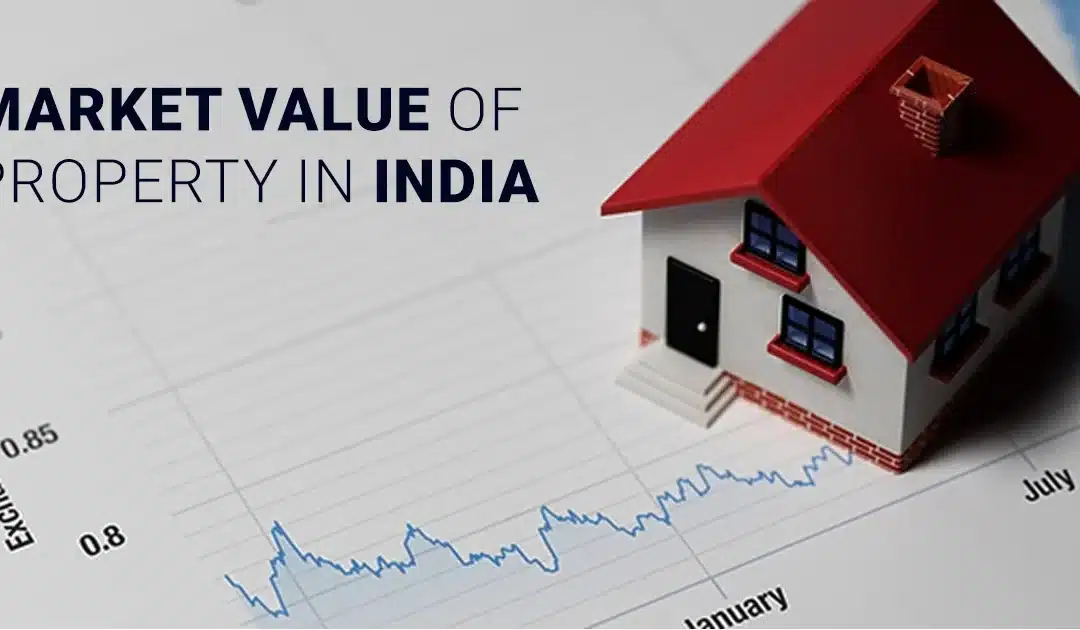
Ask ten brokers for a quote, and you could find yourself with ten different numbers, all based on little more than judgment. Welcome to the jungle of Indian real estate, where guesswork is considered the gospel. However, if you truly want to determine the market value of the property, it is now high time to set aside guesswork.
The blog is a guide to the practical, simple, and proven techniques utilized by professionals to determine the true value of the property. Buying, selling, investing, or just applying for a loan, information on how to check the property value puts the control back in your hands instead of benefiting a broker.
Because real estate is not just land and concrete-it is capital, collateral, and, in many cases, the most important financial decision in your life. And a miscalculation in valuing it? It can cost you dearly in profits, taxation, or loan eligibility.
So, let’s get down to calculating the market value of property the right way: with the utmost transparency, absolute clarity, and no room for doubt.
What Is Market Value Market Value Of Property?
Market value entails a property’s potential selling price in a reasonably competitive and freely accessible market.
It can be more simply described as the price both the willing buyer and willing seller will both be willing to transact when no one is coerced in any way.
Many factors influence market value, such as location, fitness of amenities, infrastructure, market forces of demand-supply, recent transaction values of similar properties, and other government-defined metrics like circle rates or guidance value.
Engaging with the concept of market value puts one in a position to make sound judgments or decisions concerning purchase, sales, investments, or even tax planning related to the concerned property.
Why is it important to know the Market Value of Property?
The market value of property is fundamentally important in:
Fair Pricing:
- Establishes not selling lower than given-or, in some cases, higher-than-ordinary.
Loan Approvals:
- Banks value property before sanctioning home loans.
- Stamp Duty Calculation:
- Both registration charges and stamp duty are levied at either the circle rate or at the actual transaction value, whichever is higher.
Taxation:
- Accurate valuation helps in carrying out calculations related to the capital gains income tax.
Settlement of Disputes:
- In other cases, such as inheritance or divorce, or even dissolving partnerships, knowledge about property worth helps in arriving at a fair settlement.
Additionally, property valuers and developers rely heavily on accurate valuations to understand the return on investment (ROI) and identify future areas for growth.
How to Calculate the Market Value of Property in India?

Different methods and approaches exist to arrive at property values. Here’s how the procedure is carried out:
Circle Rate/Ready Reckoner Rate
The circle rate in India is determined by each state government’s assessment. The lowest price threshold for registering real estate is known as the circle rate, ready reckoner rate, or guidance value. The local authorities determine this rate, which is different for different areas.
How to find property prices using circle rates:
See the local registrar or the state revenue department website. Enter details of the property, such as location, plot size, type (residential/commercial), and the government-assessed value will be returned. Keep in mind that circle rates are mostly lower than the actual market rates, especially in high-demand areas.
Comparable Sales Method(Sales Comparison Approach)
- The most widely used and realistic approach to arriving at market value.
How to determine property value through this approach:
- Locate 3-5 property sales recently concluded in the same neighbourhood that exhibit similar features.
- Adjust the prices for other differences, such as level in the building, amenities, size, and age of construction.
- Bring it down to an average cost per square foot, which is eventually applied to the subject property.
- This gives a realistic report of the ongoing market trend.
Income Approach
- This is best applicable to commercial property and rent-bringing properties.
Market Value:
- Net Annual Income/Capitalization Rate
Net Annual Income:
- Expected Rent Receipts minus Maintenance Charges.
Capitalization Rate:
- Depending on location and property type, it usually lies in the range of 6% to 10% in India.
- This is a good method when investors estimate property returns.
Cost Approach
- Where newer constructions or unique properties are concerned, this method determines the cost of a building after a property is constructed from scratch, with the land being an added cost.
Market Value:
- Cost of Land+Cost of Construction-Depreciation
- This is very useful to determine the valuation of properties under construction and newly constructed ones.
Factors Affecting the Market Value of Property
- Aspects to consider before calculating the actual worth of the property:
Location and Connectivity
- The maximum influences impact the value. Proximity to schools, markets, public transport, and commercial areas. Property in metro cities has higher prices than those with planned infrastructure projects.
Age and Condition of the Property
- Generally, a newly constructed property has a higher value than an older building unless the older one is heritage or located within a premium zone.
Market Value of Property
- Gated communities offering facilities like a gym, pool, parking, security, and clubhouse fetch higher market rates compared to standalone buildings
- More usable space, such as an area carpeted, a better floor plan, more ventilation and light, etc., raises the value of the property.
Legal Status with Title
- Clear legal title, RERA registered, and free from encumbrances make the property substantially credible and marketable.
Prospective Development in that Vicinity
- Future infrastructure can be a metro station, a new flyover, SEZ, and educational institutions, forming a good part of the future expected value appreciation of a property.
How to Get a Professional Property Valuation?
Amongst others, self-assessment will work, but it is better if a clear-cut valuation is done by a registered property valuer for the following purposes:
Assessment of property tax
Legal proceedings
For loan approvals
While making financial planning and investment decisions
You can consult:
Valuations carried out by government-approved evaluators are registered with the Income Tax Department (ITD). Chartered surveyors, recognized real estate consultants of CREDAI or NAREDCO. These reports are mostly recognized by financial institutions and the courts. Certified valuation reports have technical and legal parameters and are particularly useful for high-value transactions or disputes.
Common Mistakes to Avoid When Calculating Property Value
- Market trends are never taken into consideration; only circle rates are relied upon.
- The older properties are not overlooked when assessing their value by the existing depreciation.
- Facilities are oversold; not all swimming pools will increase the price by 10 lakhs.
- Assume listing price = market value.
- Hidden costs like registration fees, GST, brokerage, etc., are ignored.
- Market-specific factors like future zoning plans, water supply problems, or civic disputes affecting valuation are neglected.
In the ever-changing and often unpredictable realty sector of the continent of India, if someone really knows how to determine the market value of property, it is an absolutely important thing he/she must consider for a rational decision. Whether you are a first-time buyer or an experienced investor or just a person willing to sell his or her property, a basic knowledge of market value, how it is derived, and the possible means to check its correctness would increase transparency in the whole process.
Interestingly, a property’s real value goes beyond mere square footage to include location, potential, and market readiness. The precise valuations will provide you with bargaining power to obtain a better quality, as well as invest judiciously and get things right without paying a high price.
On uncertainty, hiring a professional valuer or legal adviser would be a good bet, assuring you of the safety of your investment.
Read Also: https://www.luxuryroof.in/
FAQs
In assessing capital gains and corresponding taxes, the income tax department considers the greater value of the declared transaction price or the circle rate.
Ideally, the market value needs a reassessment every one to two years or whenever there are major changes in infrastructure or legal regulations affecting the locality.
Online tools give a rough estimate. However, for an accurate and legal report, the application of a professional valuer is necessary.
Not always. While the two could be close, the sale price can have emotional premiums, distress discounts, or be based on the play of negotiations, whereas market value is just an objective valuation.

